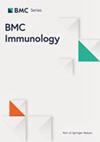Helminth-derived proteins as immune system regulators: a systematic review of their promise in alleviating colitis
IF 2.9
4区 医学
Q3 IMMUNOLOGY
引用次数: 0
Abstract
Helminth-derived proteins have immunomodulatory properties, influencing the host’s immune response as an adaptive strategy for helminth survival. Helminth-derived proteins modulate the immune response by inducing anti-inflammatory cytokines, promoting regulatory T-cell development, and ultimately favouring a Th2-biased immune response. This systematic review focused on helminth-derived proteins and explored their impact on reducing inflammatory responses in mouse models of colitis. A systematic search across Medline, EMBASE, Web of Science, and Cochrane Library identified fourteen relevant studies. These studies reported immunomodulatory changes, including increased production of anti-inflammatory cells and cytokines. In mouse models of colitis treated with on helminth-derived proteins, significant improvements in pathological parameters such as body weight, colon length, and microscopic inflammatory scores were observed compared to control groups. Moreover, helminth-derived proteins can enhance the function of Tregs and alleviate the severity of inflammatory conditions. The findings underscore the pivotal role of helminth-derived proteins in immunomodulation, specifically in the axis of cytokine secretion and immune cell polarization. The findings offer new opportunities for treating chronic inflammatory conditions such Crohn’s disease.作为免疫系统调节剂的螺旋藻衍生蛋白:对其缓解结肠炎前景的系统回顾
蠕虫衍生蛋白具有免疫调节特性,可影响宿主的免疫反应,是蠕虫生存的一种适应性策略。螺旋虫衍生蛋白通过诱导抗炎细胞因子、促进调节性T细胞发育以及最终有利于Th2偏向的免疫反应来调节免疫反应。本系统综述重点研究蠕虫衍生蛋白,探讨它们对减轻小鼠结肠炎模型炎症反应的影响。通过对 Medline、EMBASE、Web of Science 和 Cochrane 图书馆进行系统检索,发现了 14 项相关研究。这些研究报告了免疫调节变化,包括抗炎细胞和细胞因子产量的增加。在使用蠕虫衍生蛋白治疗结肠炎的小鼠模型中,与对照组相比,体重、结肠长度和显微炎症评分等病理参数都有显著改善。此外,蠕虫衍生蛋白还能增强Tregs的功能,减轻炎症的严重程度。这些发现强调了蠕虫衍生蛋白在免疫调节中的关键作用,特别是在细胞因子分泌和免疫细胞极化轴中的作用。这些发现为治疗克罗恩病等慢性炎症提供了新的机会。
本文章由计算机程序翻译,如有差异,请以英文原文为准。
求助全文
约1分钟内获得全文
求助全文
来源期刊

BMC Immunology
医学-免疫学
CiteScore
5.50
自引率
0.00%
发文量
54
审稿时长
1 months
期刊介绍:
BMC Immunology is an open access journal publishing original peer-reviewed research articles in molecular, cellular, tissue-level, organismal, functional, and developmental aspects of the immune system as well as clinical studies and animal models of human diseases.
 求助内容:
求助内容: 应助结果提醒方式:
应助结果提醒方式:


